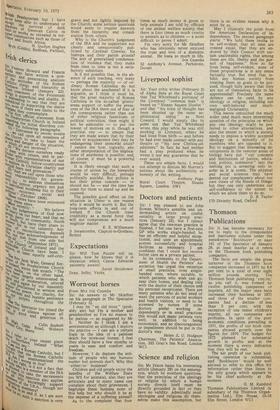Science and religion
Sir: Mr Dixon bases his interesting article (January 29) on the assumption, which he nowhere questions, that the principles of the ideology or religion by which a human society directs itself must be directly grounded in fact or they have no validity. Admittedly most ideologies and religions do themselves make this assumption, but there is no evident reason why it must be so.
May I illustrate the point from the American Declaration of Independence. The second paragraph starts: "We hold these truths to be self-evident, that all men are created equal, that they are endowed by their Creator with certain unalienable rights, that among these are life, liberty and the pursuit of happiness." Now so far from being self-evident, none of these propositions is in any sense factually true. But need that inhibit any human society from treating them as goals to be pursued, though fully aware that they are not of themselves facts to be apprehended? Precisely the same defence can be used by any ideology or religion, including our own well-beloved and muchmaligned Christianity.
This leaves untouched the much wider (and much more interesting) question of the principles on which any one ideology might be preferred to other alternatives, and also the extent to which a society needs to impose a widely accepted ideology on a minority of its members who are opposed to it. But to suggest that interesting developments in the remoter areas of biology have put "our concepts and institutions of justice, educa tion, politics, commerce" into the melting pot is arresting only insofar as it is comic. The physical and social sciences may have dented our complacency about our own views of the fitness of things; but they can only undermine our self-confidence to the extent to which we allow them to do so.
D. B. Taylor 170 Divinity Road, Oxford










































 Previous page
Previous page